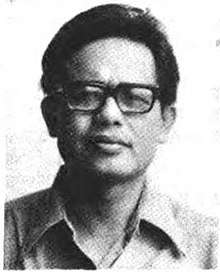Jakob Oetama
Dr (HC) Jakob Oetama (born Borobudur village, Magelang 27 September 1931), is an Indonesian senior journalist and also a media tycoon; the co-founder and owner of Kompas Gramedia Group, the largest media group in Indonesia.[1] Together with P.K. Ojong, he established Kompas Daily in 1965, one of leading newspaper in Indonesia.
Jakob Oetama | |
|---|---|
 Jakob in 1971 | |
| Born | September 27, 1931 |
| Alma mater | Gajah Mada University |
| Occupation | President Director and Founder of Kompas daily |
| Years active | 1965 - now |
He successfully managed a nationwide circulated newspaper amid the repressive circumstances; navigating Kompas daily's policy throughout Suharto's authoritarian regime (1965–1998), which was quite oppressive against press and media freedom. His calm, modest, polite and soft personality is reflected in his journalistic approach and his media demeanor, which offers the so-called peaceful journalism, and managed to open the new horizon of the press that is completely modern, accountable, responsible, non-partisan, and has a far-sighted perspective.[2]
His media business includes at least 50 publications, including the well-respected Kompas daily, while the company also has over 100 bookstores across Indonesia.[1] Its latest push is into the television business, launched Kompas TV in 2011. Kompas’ interests in the property sector, which include the Santika hotel chain, is currently concentrating on convention halls. In 2013 Jakob Oetama was listed as the 26th richest Indonesians, with $1.3 billion net worth of assets.[1]
Currently he is a President Director of Kompas Gramedia Group, member of board of trustees of Indonesian Journalists Association, advisor of ASEAN journalists confederation. Receiver of Mahaputra Utama award from Indonesian government in 1973,[3] and receiver of Honoris Causa in communication from Gajah Mada University on 17 April 2003.[2] Jakob Oetama is still active as a participant in debate and dialogue on national issues and a great supporter of the arts, by establishing Bentara Budaya galleries in Jakarta, Yogyakarta and Bali.
Early life and education
Jakob Oetama born from a modest Javanese family of Catholic background, resided in a village near Borobudur temple, Magelang Regency, Central Java, during Dutch East Indies era in 1931. Jakob is the son of a teacher in Sleman, Yogyakarta. His parents directed him to be either a priest or teacher, following his father's footsteps. Jakob finished his basic educations in Yogyakarta, and then continued his education to Seminary High School in Yogyakarta (1951).[2] In early times of his career, he worked as a teacher in Mardiyuwana junior high school in Cipanas, Cianjur, West Java, and then to Van Lith junior high school in Jakarta. He also worked as an editor in Penabur weekly in Jakarta. He continued his teaching education majoring in history education and graduated in 1956. Jakob then continued his study in higher education on journalism in Jakarta and graduated in 1959, he also studied in Gajah Mada University majoring in journalism and graduated in 1961.[3][4]
Career
Jakob's journalistic career started when he became an editor in Penabur weekly in 1956. In 1963, he established Intisari magazine with his business partner and also fellow journalist, P.K. Ojong, which was inspired by US' Reader's Digest magazine. Two years later, on 28 June 1965, also with Ojong, Jacob established Kompas daily.
Kompas daily circulation grow from initial circulation of 4,800 copies in 1965 to around 500,000 in 2014. Since 1969, it has been the largest national Indonesian language newspaper in Indonesia. Kompas reached its peak circulation in 2004, when its daily circulation reached some 530,000 copies, and its Sunday edition, 610,000 copies. Readership totaled some 2.25 million. In 2014 its circulation reached 507,000, with 66% circulating in Greater Jakarta.[5]
In 1980s Kompas Gramedia Group as holding company started to grow and expands, especially in communication business. Today, Kompas Gramedia Group owned numbers of companies in various line of business, from media, book stores, printing, radio, hotel, event organizer, television station, to education institution and university. Together with Jusuf Wanandi, Muhammad Chudori, Eric Samola, Fikri Jufri, Goenawan Mohamad, H. G. Rorimpandey dan Harmoko; Jakob Oetama also established the Jakarta Post, English language Indonesian newspaper.[6]
During Kompas daily 50th anniversary on 28 June 2015, Jakob Oetama expressed his gratitude for the blessings of the media's longevity, appreciates the trust, contribution and dedication of the whole people that supports Kompas daily. He also stated the media commitment to always be the true reflection of Indonesia and its goals; an advance, enlightened, peaceful and harmonious society that values pluralism, as encapsuled in the national motto Bhinneka Tunggal Ika.[7] He also stated that the current challenge for conventional newspaper business is to survive and strive in the era of multimedia, multichannel and multiplatform in both conventional and digital media environment.
References
- "150 Richest Indonesians". Jakarta Globe.
- "Biografi Jako Oetama: Tawarkan Jurnalisme Damai". Tokohindonesia.com. Retrieved 4 January 2014.
- Jakob Oetama (October 2001). Berpikir Ulang tentang Indonesia (in Indonesian). Kompas.
- "Profil: Jakob Oetama". Merdeka.com (in Indonesian). Retrieved 4 January 2014.
- "Kompas Media Kit 2014" (PDF). Kompas. Retrieved 29 October 2015.
- The Jakarta Post: It is trusted, it is incredible, April 25, 2013. 30th Special Anniversary Issue.
- Icha Rastika (28 June 2015). "Jakob Oetama: Tak Ada Kata Selain Syukur dan Terima Kasih". Kompas.com (in Indonesian). Retrieved 29 October 2015.